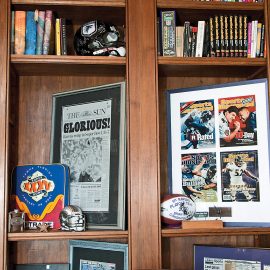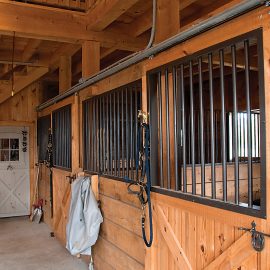Home & Living
The Life of Brian
He may not be coaching anymore, but Brian Billick tackles everything—including his new Eastern Shore estate—with the same fierce attention to detail.
When former Ravens head coach Brian Billick and his wife Kim decided to build a spectacular waterfront home on Maryland’s Eastern Shore, their decision to settle in the Mid-Atlantic for good surprised even themselves.
Billick, who was raised in California and had coaching stints in San Diego and Los Angeles, and Kim, who’s from New Mexico, always assumed they’d go west.
“I’m a West Coast guy,” admits the 56-year-old Billick. “My concept of the East Coast was always that Boston to D.C. was one giant megalopolis. When we moved to the Baltimore area, it was shocking to me how readily you could get out of the city. You come over the Bay Bridge and things calm down. It’s a palpable feeling. I had no idea there was this type of open space here. In a million years, I never thought we’d end up on the East Coast.”
Billick first fell in love with the Eastern Shore shortly after the Ravens won Super Bowl XXXV in 2001, only his sophomore year with the team. At the time, Billick was doing promotional work for a boat building company called Sea Ray. As a perk, he was given a cabin cruiser to tool around the Chesapeake.
“I loved being on the water,” says Billick, “but I didn’t know anything about the Chesapeake. Through having the boat, we started exploring Annapolis, St. Michaels, and Easton. We just fell in love with the area.”
Though Billick was almost too busy during the football season to even make it back to his primary home in Reisterstown, he and Kim had started to entertain the idea of another home, possibly one that they could live in long after he retired. In 2004, after stopping in Easton for lunch, the Billicks decided on a lark to visit the real estate office next door.
“We met this man over lunch who had moved here from New York,” recalls Kim. “And I could see the wheels turning in Brian’s mind.”
By 2005, the couple had settled on a 15-acre waterfront property on the Eastern Shore.
Not surprisingly, the veteran coach approached the building of his dream home as if he was putting together an all-pro team. The Billicks hired venerable Annapolis-based Pyramid Builders and then turned to the talents of their former Reisterstown neighbor and friend Frederike Hecht (of the Baltimore-and-Los-Angeles-based Frederike’s Designs) to create both the exterior and interior spaces.
“If you asked 10 people [going through a home build], five of them sued their contractor or architect,” cracks Billick. “It’s like standard operating procedure!
Frankly, I was a little cynical going in. I’m a coach, and we talk about team concept. On this project, the incredible team we put together included Bret [Anderson, president of Pyramid Builders] and his group, Freddie, me, and Kim. They were all there throughout the process. This all came together because of that team.”
When the Billicks first began the project, Brian was still head coach of the Ravens. But once the construction was already underway, he lost his job.
“I remember thinking I have to speak with him,” recalls Anderson. “I was thinking about what I should say when he ended up calling me.”
Billick reportedly said: “The good news is, I still have three years of my contract left, so I’m not going to run out of money. The bad news is I’m going to watch every move you make.”
Jokes Billick, “I went from telling Bret that time was not a big issue [to saying], ‘I’m your worst nightmare, ’cause I want it, and I want it now!’”
Billick, notorious for his almost obsessive attention to detail as a coach, was not going to let a single aspect of the construction go forward without his input.
“It was very easy for me to identify how he had been successful as a coach,” says Anderson. “He kept a detailed and organized notebook. He visualized spaces and how big the rooms needed to be. His notebooks were like something you’d see out of a playbook.”
In August 2009, after two years of overseeing the building, the Billicks moved in. Where there was once nothing but cornfields, there now stood a classic European-style estate with slate rooftops, specially framed stucco walls with large inset windows, salvaged wide-planked heart pine floors, handcrafted doors, hand-carved fireplace mantels, and a graceful, 130-foot long waterfront loggia—all an attempt to make the home appear as if it was built centuries ago.
“Figuring out a way to make something look 300 years old is a little more difficult than we thought,” says Kim. “We laugh about it now.”
Of course, the home still has all the amenities of the 21st-century, from a tennis court and pool and cabana area to a stately horse barn and boat dock with a speedboat and kayaks at the ready.
It’s a drizzly day in October, and Brian Billick sits in an oversized armchair—shoes off, cup of coffee in hand—with Kim at his side, and a blaze from one of his five fireplaces crackling in the distance.
This is allegedly his downtime—he just flew in on the red-eye from Los Angeles, where he works for Fox as an NFL analyst—but you wouldn’t know it from his activity level. There’s a Baltimore Sun reporter in the house, interviewing Billick for a Super Bowl commemorative, and the former coach is constantly on his computer or his cell phone chatting about teams, stats, and schedules.
Within 48 hours, he will be off and running again, this time to Philadelphia to tape two shows for the NFL Network before being dispatched again to another football game to interview coaches and watch practices and then back to Los Angeles, where he’ll give his insider analysis.
For anyone who has ever wondered, “Whatever happened to Brian Billick?” the answer is that, despite being let go by the Ravens in 2007, he has hardly been sidelined.
As Billick reflects on his coaching career, he remains philosophical about losing his Ravens gig, though, clearly, it still smarts.
“It’s dehumanizing,” says Billick, his rich, made-for-broadcast baritone growing quieter. “But it’s nothing personal. I’ve been in this business long enough to know that at the end of the day, it’s just business.” The irony is that the man known for his tactical maneuvers on the football field was blindsided by the firing.
“One of the things I regret the most is that I wasn’t more aware,” says Billick. “[Owner] Steve Bisciotti walked in almost one year to the day of giving me a new four-year contract to give me the news. They say a vote of confidence is your death knell, and in this instance for 16 games straight, I was told, ‘They’ll be no change. This is my coach.’ It caught me off guard. My regret is that I hadn’t prepared my staff better.”
Still, Billick feels no ill will, and says that he loves his home team.
“I am still a Ravens fan,” he says. “We have chosen to live here. I bear no animosity—there is no upside to that, and I have too many friends who are part of that organization.”
When Billick is out and about, his fans are quick to weigh in with their thoughts.
“I’m never in the airport or in Baltimore when someone doesn’t come up and want to thank me for the Super Bowl championship,” says Billick. “Now, these are likely the same people who wanted to run me out of town or who went on the radio cussing me for this play or that play,” he says with a laugh. “But it is humbling, and their comments are heartfelt.”
Growing up in Redlands, CA, Billick was an avid athlete, whose dad, a retired Air Force test pilot, was a home-building hobbyist who constructed every house the family ever lived in.
“I mixed my share of cement and dry wall,” Billick says with a chuckle. “I did my chores, but I wasn’t really into learning about it. I was too into sports.”
Billick played basketball at Redlands High School, but football was his real passion.
“I grew up in a town in Southern California that really belonged in Texas,” he says, “because football permeated the whole town—8,000 people would attend the high school football game. We’d go to school, play tackle football games, choose up sides, and play until it got dark—that’s just what you did when you were a kid. I can remember wanting to coach almost as far back as I can remember wanting to play. It never occurred to me that this wouldn’t be my career.”
Success came early for Billick as he rose through the coaching ranks while still in his 20s. He kicked off his coaching career as a wide receivers coach for the University of Redlands football team and was an assistant coach at his high school alma mater before landing a position with San Diego State University. By 1986, he was working as an offensive coordinator at Utah State University, where he improved the team dramatically. More glory followed with the Minnesota Vikings, where his Cris-Carter-and-Randy-Moss-powered offense broke several offensive records. In 1999, he was hired by the Ravens.
Given that coaching has been his career for 30 years, would Billick consider another on-field gig?
“[Former Steelers coach] Bill Cowher had a great career for 13 years, then had the Super Bowl and went off into the sunset,” says Billick. “And that’s probably how it should be.”
But he admits that winning the championship his second year as a head coach put additional pressure on him. “Every year, it’s, ‘Can you get another Super Bowl?’ It’s pressure you put on yourself, and it’s a great challenge. [But] if I didn’t have a Super Bowl ring, I might have a different perspective on [going back],” he says. “I might have that need to go back and reach the ultimate game, but winning early like that does change the equation and the perspective a little bit.”
For now, Billick is content to watch the game from his stadium seat.
“There’s a part of me that misses it,” he says wistfully. “I miss the battle on game day, the relationships, the challenge in putting the team together. But frankly, there are things I don’t miss. When I am sitting in the stadium, I look at what that coach is going through, and I feel like I get the best of both worlds. I visit with the coaches and players on Friday. I’m at the stadium with all the pomp and the pageantry and the excitement and when all of that is over, I get to get on a plane and not give a damn who won or lost and I get to go home and sleep a lot better than a lot of the coaches.”
And Kim is extremely happy to have hubby home in the more settled (and far less stressful) life of TV analyst.
“For years, we watched houses going up in every neighborhood in every town we’d ever lived in, dreaming of the house we would eventually be able to have,” says Kim. “This was at the end of that dream.”













